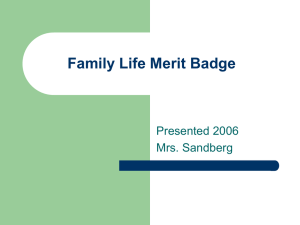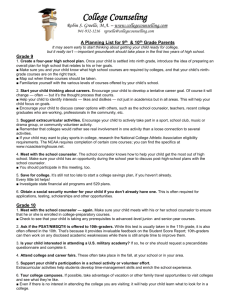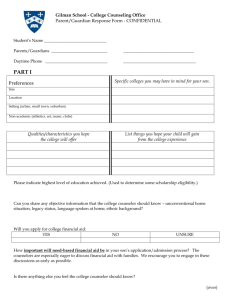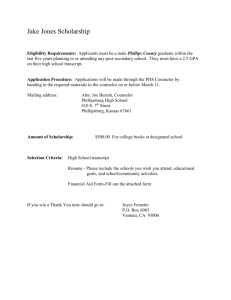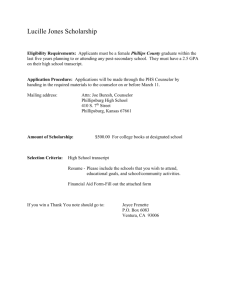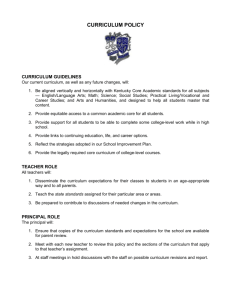File - MooseyPortfolio
advertisement
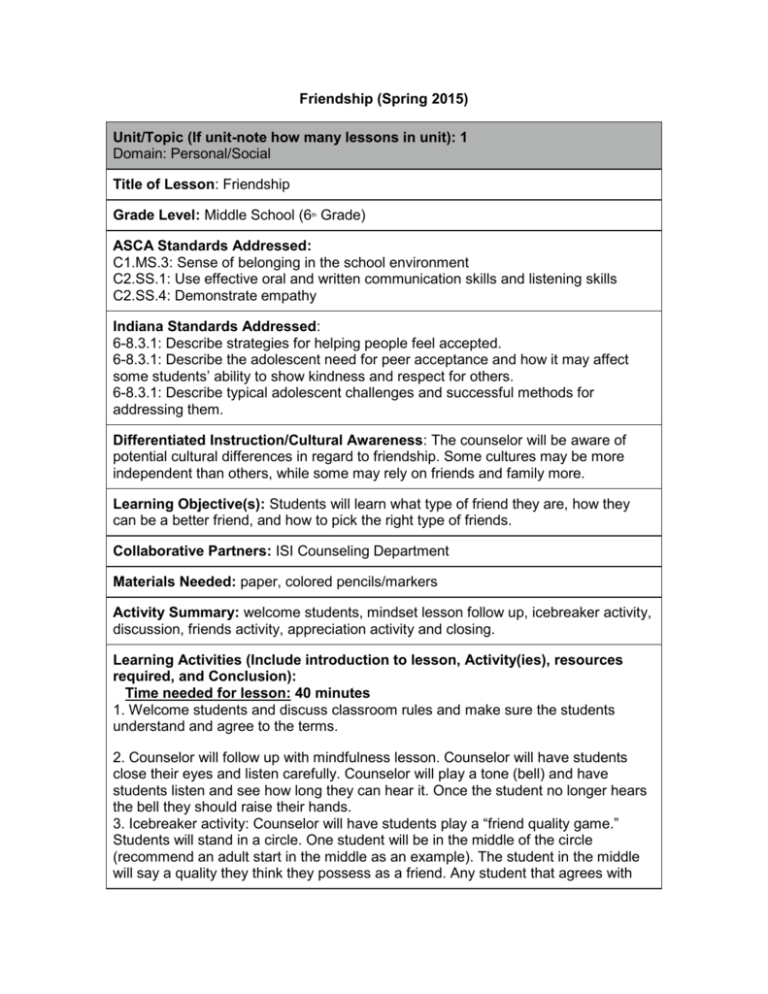
Friendship (Spring 2015) Unit/Topic (If unit-note how many lessons in unit): 1 Domain: Personal/Social Title of Lesson: Friendship Grade Level: Middle School (6 Grade) th ASCA Standards Addressed: C1.MS.3: Sense of belonging in the school environment C2.SS.1: Use effective oral and written communication skills and listening skills C2.SS.4: Demonstrate empathy Indiana Standards Addressed: 6-8.3.1: Describe strategies for helping people feel accepted. 6-8.3.1: Describe the adolescent need for peer acceptance and how it may affect some students’ ability to show kindness and respect for others. 6-8.3.1: Describe typical adolescent challenges and successful methods for addressing them. Differentiated Instruction/Cultural Awareness: The counselor will be aware of potential cultural differences in regard to friendship. Some cultures may be more independent than others, while some may rely on friends and family more. Learning Objective(s): Students will learn what type of friend they are, how they can be a better friend, and how to pick the right type of friends. Collaborative Partners: ISI Counseling Department Materials Needed: paper, colored pencils/markers Activity Summary: welcome students, mindset lesson follow up, icebreaker activity, discussion, friends activity, appreciation activity and closing. Learning Activities (Include introduction to lesson, Activity(ies), resources required, and Conclusion): Time needed for lesson: 40 minutes 1. 1. Welcome students and discuss classroom rules and make sure the students understand and agree to the terms. 3. 2. Counselor will follow up with mindfulness lesson. Counselor will have students close their eyes and listen carefully. Counselor will play a tone (bell) and have students listen and see how long they can hear it. Once the student no longer hears the bell they should raise their hands. 4. 3. Icebreaker activity: Counselor will have students play a “friend quality game.” Students will stand in a circle. One student will be in the middle of the circle (recommend an adult start in the middle as an example). The student in the middle will say a quality they think they possess as a friend. Any student that agrees with this characteristic should step into the middle and then replace one of the positions in the circle where other students were standing. The person who does not find a way to replace their peer will then be the new person in the middle to state a characteristic. 4. Discuss what characteristics make up a good friend (Write on board to provide a visual). -- How are you a friend to others? -- What makes a good friend? -- After a student answers, counselors can ask them what that means to them (i.e., what does dependable or respectful mean to them). Counselor can ask other students if they have any additional comments. Options for what students may say: • Good friends listen to each other. • Good friends don't put each other down or hurt each other's feelings. • Good friends try to understand each other's feelings and moods. • Good friends help each other solve problems. • Good friends give each other compliments. • Good friends can disagree without hurting each other. • Good friends are dependable. • Good friends respect each other. • Good friends are trustworthy. • Good friends give each other room to change. • Good friends care about each other. 5. What are things we say that can hurt our friends? Counselor will ask students to explain what they think about each scenario: -- “Your hair looks gross.” (Potential answers: This is too honest. Unless its beneficial, not worth telling them). -- If your friend has something in their hair… (You’d want to kindly tell them). -- If your friend asks, “Does my hair look ok today?” (They want to know but there’s still a nice way to tell them). 5. 6. Friends Activity: Counselor will explain activity– Each student will have a piece of paper they will tape to their back. Students will walk around and write a positive friendship characteristics on at least 5 classmates back (Each classmate should have at least 5 characteristics).Try not to repeat a word already written on a piece of paper. Counselor can pose reflection questions to the students. Can have students respond out loud if there are any volunteers: Did anything written on your paper surprise you? Do you agree with everything written on your paper? Why or why not? Is there some characteristic you think you already possess as a friend that should have been added? Why do you think it is not there? Are there any qualities you would like to work on developing? Would your parents/siblings/teachers agree with the qualities written on your piece of paper? 6. 7. Acceptance, Appreciation, Tolerance Activity: Counselor will ask students to define each word. Have students write down the definitions on a piece of paper to refer back to later. What is the definition of these these words? How are they different? Tolerance- “The ability to accept belief, habits, or feelings from your own” Acceptance- “To give admittance or approval to” Appreciation- “A feeling of being grateful for something; an ability to understand the worth, quality, or importance of something; full awareness of understanding of something” When would you use acceptance? Tolerance? Appreciation? (Trick Q: Appreciation should be the answer!) What are examples of how you would show acceptance? tolerance? appreciation? 8. Counselor will dismiss students. Evaluation Plan: The counselor will listen to discussions of the students and note key pieces the students discuss. The counselor will also follow up with students during later guidance lessons. Follow-Up Plan: Students can schedule follow-up appointments with the counselor if they have any questions or concerns about how to make good friends/be a good friend. References/Resources Used: http://www.goodcharacter.com/BCBC/Friendship.html http://www.internet4classrooms.com/links_grades_kindergarten_12/friendship_and_ belonging_guidance_counselor_lesson_plans.htm http://www.merriam-webster.com/dictionary/tolerance http://www.merriam-webster.com/dictionary/appreciation http://www.merriam-webster.com/dictionary/accept
